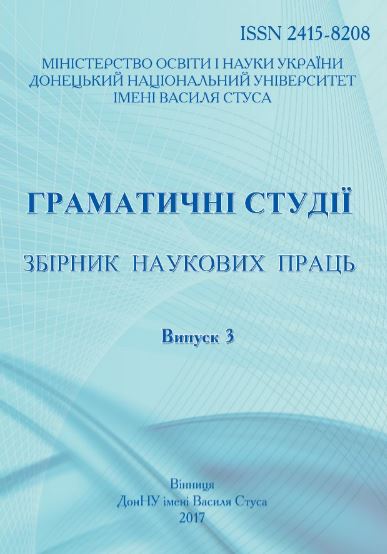Peculiarities of Professional Jargon Usage in Business Discourse.
Keywords:
business discourse, professional jargon, corporate jargon, marketing speak, socio-professional groupsAbstract
Specific features of social dialects used in contemporary polycultural society are reflected in business discourse. Professional jargon is often used as socially marked vocabulary in business discourse. Business English is a professional jargon falling into a number of subcategories such as formal jargon, corporate jargon (used in large corporations, bureaucracies, and similar workplaces) and marketing speak (used in marketing press releases, advertising copies, and prepared statements read by executives and politicians).References
Новолодская С. Л. Дефиниция понятий «поликультурный» и «мультикультурный» / С. Л. Новолодская // Вектор науки ТГУ, 2012. – №1 (8). – С. 234-237.
Adorno, T. The Jargon of Authenticity / T. Adorno. – London: Routledge. 2009. – 188 p.
Andersson L. and Trudgill P. Bad Language / L. Andersson, P. Trudgill. – London: Penguin. 1990. – 208 p.
Bargiela-Chiappini, Francesca, Nickerson, Catherine, Planken, B. Business Discourse / F. Bargiela-Chiappini, C. Nickerson, B. Planken. – London: Palgrave Macmillan. 2013. – 359 p.
Cook G. Discourse / G. Cook. – Oxford: Oxford University Press, 1989. – 213p.
Danyushina Y. Business Linguistics – A New Interdisciplinary Synergy / Y. Danyushina // International Journal of Arts & Sciences. – International Journal.org, 2011. – 4.18. – P. 177-186.
Daniushina Y. Business linguistics and business discourse / Y. Daniushina // Caliodoscopo. – Unisinos, 2010. – Vol. 8, n.3. – P. 241-247.
Erdmann, E. Neologisms in Business – an Indication of our Incessantly Developing Economy (Part 1) [Електронний ресурс] / E. Erdmann // Transliteria Polish Translations. – 2011. – Wednesday, 19 January. – Режим доступу : www.transliteria.co.uk
Grygiel M. Business English from a linguistic perspective / M. Grygiel // English for specific purposes. – World, 2015. – Special Issue №1, Vol. 16. – P. 1-12.
Hudson, K. The Jargon of the Professions / K. Hudson. – London: Macmillan. 1979. – 146 p. Jargon Buster: Common procurement words & expressions explained / Buster Jargon. – Wellington. New Zealand, 2013. – 34 p.
Khomyakov V.A. Structural-and-Semantic and Socio-stylistic Features of English Expressive Vernacular / V. A. Khomyakov – Vologda : Vologodsky State Teacher‘s Training University, 1974. – 146 p.
Lewis, M. The Big Short: Inside the Doomsday Machine / M. Lewis. – New York : W.W. Norton&Company, 2010. – 325 p.
Locker, K. O. ―‘As Per Your Request‘: A History of Business Jargon‖ / K. O. Locker // Journal of Business and Technical Communication, 1987. – 1.1. – P. – 27-47.
Pilegaard, M. ―Politeness in written business discourse: A text linguistic perspective‖ / M. Pilegaard // Journal of Pragmatics, 1997. – 28. P. – 223-244.
Rolak, I. Oral Business Discourse and the Problems of its Teaching to Foreign Students / I. Rolak // Journal of Language and Culture, 2014. – 2.26. P. – 107-116.
Silverstein, M. ―Cultural‖ concepts and the language culture nexus / M. Silverstein // Current Anthropology, 2004. – 45. 5. P. – 621- 652.
Yule, G. The Study of Language / G. Yule. – Cambridge: Cambridge Universiy Press. 2006. – 340 p.

